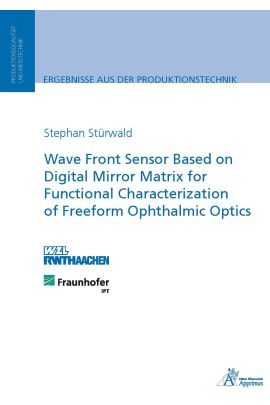Dieses E-Book können Sie hier herunterladen.
In this work the development and characterization of a wave front metrology system for varifocal eyeglass lenses is described. It allows a quantitative measurement of wave fronts up to 65mm diameter, with a lateral resolution of better than the required 1mm for the full field inline production quality control. The realized experimental low cost optical system is designed for wave front slopes up to ±2 degrees deviation from a typical spherical form. By utilizing a PSD as detector, measurements can be completed in less than 6 seconds which highly depends on the utilized light intensity.
The reproduction of the measured wavefront slope distribution with an accuracy of better than 1µm with this low cost system showed only to be sufficient for progressive eyeglasses with additional slopes less than approximately 1.5 degrees. The typical peak to valley deviation of simulated wavefront and measured wavefront is about (2±0.4) µm when using a camera as detector. But this developed system in principle enables also the optical testing of other freeform optics with fewer requirements in accuracy. A setup with more accurate optics and calibration routines - as simulations have shown - may then serve as a future universal measurement setup for functional testing of optical systems.
Although several design approaches have been performed for the system optics, only a low cost setup could be realized caused by financial restrictions. But the setup is capable of measuring the most common types of progressive eyeglasses and therefore it can be considered as sufficient for studying the proposed measurement method for this application, particularly because the calibration methods effectively compensate for aberrations.
The dependency of the detector signal intensity has been considered and enabled to correct for this through the systematical study of diffraction effects in the system. Errors due to the system setup, such as optical aberrations, can mainly be compensated through the developed calibration. Results from several tests correlate to the lenses' nominal values qualitatively as well as quantitatively. This suggests that the developed setup is suitable for its intended purpose.
The wave front slope reproduction is improved by using a camera-based detector rather than a PSD, since the PSD only offers limited precision mainly due to the diffraction pattern. The camera-based detector allows using the entire intensity distribution. However, the measurement duration increases by a factor of 3 to 10 due to the limited frame rates of imaging sensors (e.g. max. 75fps at full resolution).
Camera-based methods not only simplify the qualitative interpretation of the signals during development, but also the use of image processing algorithms and therefore allow a more robust correction of systematic errors. The comparison of different compensation algorithms gives prospects on further optimization studies.
| Autor | Stürwald, Stephan |
|---|---|
| Lieferzeit | 3-4 Tage |
| Gewicht | 0.23 kg |
| Erscheinungsdatum | 08.06.2015 |
Produktionsqualität und Messtechnik
Wave Front Sensor Based on Digital Mirror Matrix for Functional Characterization of Freeform Ophthalmic Optics (E-Book)
Kurzbeschreibung
Dieses E-Book können Sie hier herunterladen.
In dieser Arbeit wird die Entwicklung und Charakterisierung eines Wellenfrontmesssystems für Gleitsichtbrillengläser beschrieben. Es ermöglicht eine quantitative Messung der Wellenfront bis zu 65 mm Durchmesser mit einer lateralen Auflösung von besser als die erforderlichen 1mm für die Inline-Qualitätskontrolle in der Produktion. Das realisierte Low-Cost System ist für Wellenfrontsteigungen mit einer sphärischen Abweichung von ± 2 Grad konzipiert und eröffnet eine flexible funktionale Prüfung von optischen Systemen und Freiformoptiken.

